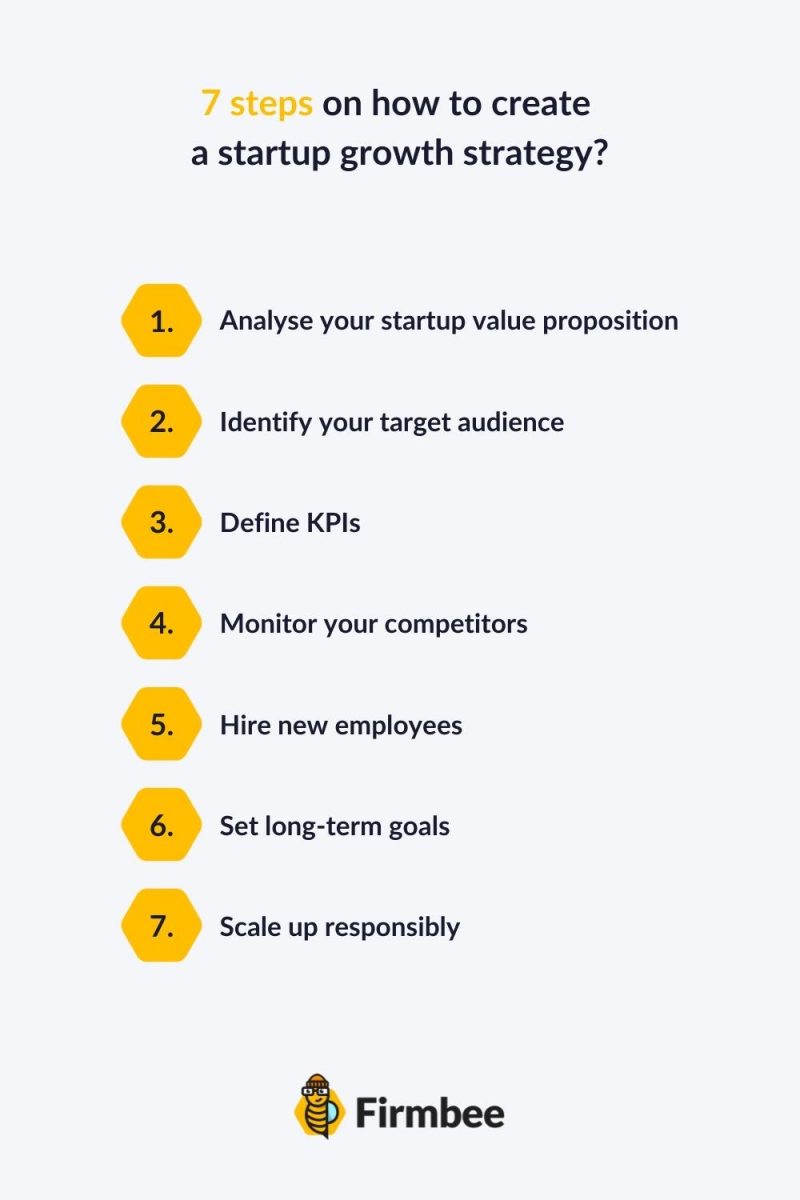Each serious startup is concentrated on its rapid development. However, in order to learn in which direction your new business should be heading, you need to prepare an effective success plan. Here are some tips for getting your startup growth strategy in place. Read on.
Startup growth strategy – table of contents:
- What is a startup growth strategy?
- Analyse your startup value proposition
- Identify your target audience
- Define KPIs
- Monitor your competitors
- Hire new employees
- Set long-term goals
- Scale up responsibly
- Summary
What is a startup growth strategy?
For starters, it is important to clarify what a growth strategy is. The classic definition explains that it is the direction an organization takes to achieve its future business success. A growth strategy should define how a company will use its resources (e.g., assets, employee knowledge, tools) to achieve its goals.
When preparing a startup growth strategy, you should analyze various strategic options and choose the best one. You need to determine what resources should be allocated to achieve the goal. A good startup growth strategy ought to be creative, flexible, responsive, challenging, engaging and above all, realistic. In order to prepare such a plan, you must focus on a number of important issues. Follow our useful tips.
Analyse your startup value proposition
It’s a good idea to start by analyzing the value proposition of your startup. This will make it easier to explain to customers why they need your company and products. Ask yourself what is unique about your startup that can meet or even exceed your customers’ expectations.
Defining a compelling value proposition is fundamental to the growth of your business. If you give up on this, you might have trouble attracting customers and investors. It’s hard to become a market leader, if you can’t establish a specific value proposition behind your business.
Identify your target audience
The next step towards preparing a realistic startup growth strategy should be identifying your target audience. Without understaning your target market, you won’t know how to improve your products and how to build marketing messages. To gain insights on your target audience, you might gather survey data, use Google Analytics, and look at social media.

Define KPIs
When it comes to building a successful startup growth strategy, it’s important to track a variety of key performance indicators (KPIs). Tracking these metrics can help you make decisions that will make your business grow. You should choose the metrics that have the greatest impact on the growth of your startup, for example:
- Customer Acquisition Cost (CAC). This KPI measures the price you pay to get a new customer. It is important to keep CAC as low as possible.
- Customer Lifetime Value (CLV). Customer lifetime value is another key metric that startups should track. It is the total net profit attributed to a customer during their relationship with your company.
- Burn Rate. It relates to the rate at which your company spends money.
- Gross Margin. Gross margin is the percentage of total revenue that is left after deducting the cost of sold goods. This metric shows how profitable your startup is.
- Conversion Rate. A conversion rate refers to the percentage of users who have completed a desired action.
Monitor your competitors
An important part of a startup growth strategy is monitoring the competition. Keeping tabs on your competitors makes sense for a number of reasons. Firstly, it gives you invaluable insight into their strategies. Secondly, it may turn out that your competitors have already solved problems that still pose a challenge to you.
Analyzing their solutions can be a proverbial shortcut for your company. Ignoring the competition is a common mistake startups make, which often leads to their failure.
Hire new employees
It’s also a good idea to include emplyment planning in your startup development strategy. Finding the right people to join your team is crucial to the success of the entire venture and the growth rate of your company. If you invest in the wrong people in the initial phase of your startup, it will be difficult to scale up later. Therefore, it is worth looking for qualified employees who will be ready to support your business.
Set long-term goals
You can’t prepare a powerful development startegy without establishing long-term goals. Goals help you remain concentrated and they can prevent your business from stagnation. Long-term goals are a kind of path set for the startup, which the company should follow. They also provide strong motivation for management and employees. These goals should be measurable, specific, time-based, and relevant to the vision of your business.
Scale up responsibly
Scaling up prematurely may break your business. Therefore, you shouldn’t take extreme steps and try to expand into new markets too early. Everything must be done at its own pace. For instance, there is no need to rent a huge and expensive office space or to get into debt heavily right from the start. Nevertheless, scaling up is important and must be taken into account in the development of every startup.
Startup growth strategy – summary
A well-crafted startup growth strategy not only outlines the direction you should take to achieve your long-term goals, but also allows you to measure the effectiveness of your actions. It is a business roadmap that shows where your organization is going and how you’re getting there.
Other resources: 5 proven business models for startups. Also, check out our project management system for sales teams!
If you like our content, join our busy bees community on Facebook, Twitter, LinkedIn, Instagram, YouTube, Pinterest.
Author: Andy Nichols
A problem solver with 5 different degrees and endless reserves of motivation. This makes him a perfect Business Owner & Manager. When searching for employees and partners, openness and curiosity of the world are qualities he values the most.
Launch your startup:
- What is a startup?
- Pros and cons of creating a startup
- 8 best industries for startups
- Top 5 skills every highly successful startup founder needs
- How to create a startup? 7 simple and easy steps
- 6 essential startup development stages
- How to create a startup growth strategy?
- General startup statistics you need to know
- Startup vs. corporate job. Which is right for you?
- 5 incredible companies that started in a garage
- How to find a business idea?
- How to check if your startup idea already exists?
- How to name a startup? Useful tips and strategies
- How to gain business knowledge quickly? 5 best practices
- Why do startups fail? 6 startup ideas you should avoid
- 5 weird business ideas that made millions
- Top 6 most profitable small businesses
- 7 questions to determine if your business idea is worth pursuing
- What is a buyer persona? 5 benefits of creating a buyer persona
- How to validate your business idea? 3 easy steps
- Should you follow your passion? The importance of passion in business
- What is market reseach and why is it important?
- Using social media in business
- What to do when you have too many business ideas?
- How to write a good problem statement for your startup?
- How to test your business idea for real?
- How to create a prototype for a product?
- How to build an MVP?
- How to use surveys for testing your business idea?
- 10 useful tools to validate your business idea
- What is a business plan? 4 types of business plans
- What should be included in a business plan?
- What should a product description include?
- Competitor analysis
- Marketing strategy
- Traditional business plan vs. lean startup plan
- Implementation plan. What is it and how to create it?
- Everything you need to know about patents
- Financial management for startups
- What permits and licenses does my startup need?
- What is the average startup founder salary?
- 4 startup taxes you need to pay
- Which legal structure is best for your business?
- Startup costs. How much money will you need?
- Protection of intellectual property in a startup
- Family funding vs. self-funding
- What is a shareholders’ agreement?
- What should a financial section of a business plan include?


















